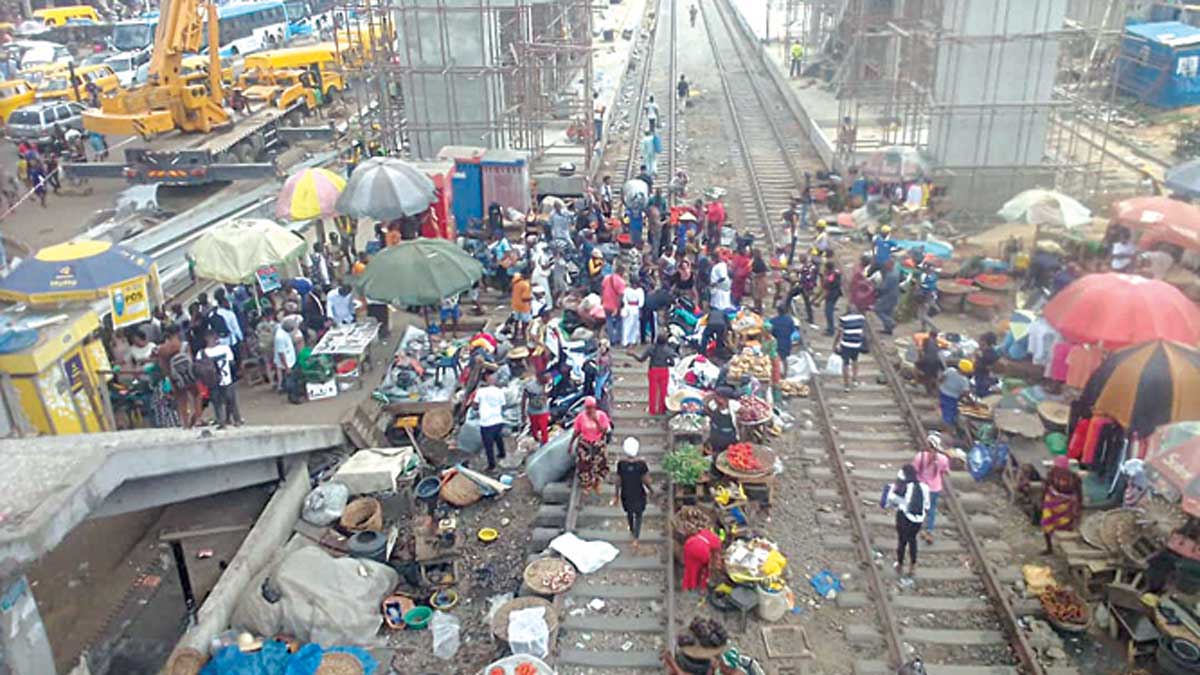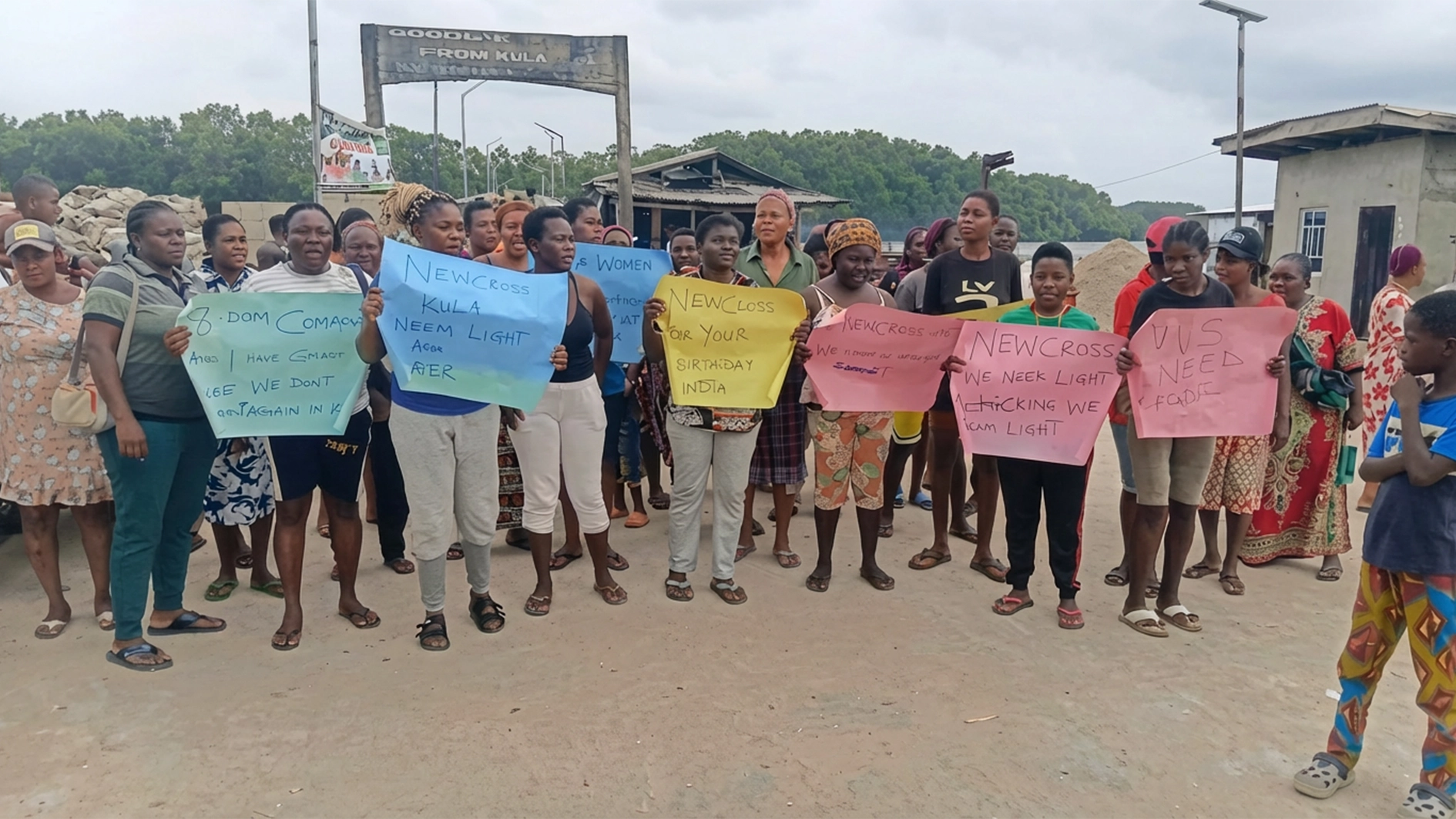
•Touts impose daily levy on traders
Despite the death of eight people in the recent tragic Lagos train-bus collision at PWD Bus Stop, Lagos, some traders are still selling their commodities along rail tracks in the metropolis.
When The Guardian visited the spot, yesterday, traders were seen selling their wares along the rail tracks, without considering the health hazards. There have been catalogues of rail mishaps on the same corridor.
For instance, in 2020, after the COVID-19 lockdown, an accident involving a moving train, a bus and a Toyota Sports Utility Van (SUV) occurred near the Nigerian Army Shopping Arena in Oshodi.
In the SUV were a trader and his son, who parked beside the tracks, waiting for Oshodi Shopping Complex, Arena, to be opened for business. Unknown to him, metres away from the parking spot, a train collided with a bus and dragged it along the tracks.
Unfortunately, before the man could move his car out of danger, the train hit it and knocked the SUV down a distance before coming to a stop. The trader lost his life, and his son was seriously injured in the accident.
Also, on January 10, 2019, at the Ashade railway crossing around Agege-Ikeja, Lagos, a train skidded off its tracks and killed one person, leaving many others injured.
Notwithstanding the inherent dangers of crossing train tracks, some Lagosians have taken to the tracks to sell their wares or even make them relaxation points.
The occurrence is common at Ikeja Along, close to the Ikeja Local Council and Oshodi rail tracks. The Guardian gathered that touts collect daily levies from these traders.
A trader at Ikeja Along, who pleaded anonymity, said these touts collect compulsory levy from them daily. Another trader, who simply identified himself as Sunday, said these unauthorised individuals collect as much as N10,000 for a spot in the rail track, while ‘old’ traders pay a compulsory fee of N500 daily.
Sunday, who sells clothes at Ikeja Along, said these illegal levies are without receipts, and traders are forced to pay for unhindered activity. Upon enquiry, Ikeja Local Council denied knowledge of the levy or collaboration with the touts.
But one of the traders said they also pay some token to railway workers to sell at the track because of its huge human traffic.
Similarly, a tomato seller at the Mosafejo area of Oshodi, Mrs. Seun Owolabi, said the rail track was the only place she can afford. According to her, she cannot afford to rent a shop inside the market, while she can easily pay a levy of N500 to sell at the spot. Owolabi said the track was lucrative because potential customers pass through the rail lines on a daily basis.
She said: “ I have been selling here for some time now and I can tell you that sales have been good by God’s grace. Traders selling here are fully aware of the dangers of potential train accidents, that’s why we are extremely careful when we hear the horn of a train from a distance, whenever it is in motion, and we are always quick to move our goods, and return them when the train had gone.”
Beyond trading along the rail tracks, some street urchins have also taken the tracks as sleeping spots without minding the risk involved. When The Guardian visited yesterday, the boys were seen carelessly sleeping on the tracks.
But the Chief press secretary to the chairman of Odi Olowo/Ojuwoye Local Council Development Area (LCDA), Abubakar Babatunde Illias, said neither the local council nor the state is aware of the illegalities happening on the rail tracks. He added that the council would conduct a probe to check the anomaly.
When contacted, spokesperson for NRC, Mr. Yakub Mahmood, denied that railway officers were collecting money from traders to sell on the tracks. Also, the Managing Director, NRC, Fidet Okhiria, in a recent interview with The Guardian, said the corporation is modernising to keep people off the tracks.
Okhiria said: “We have about 11 overhead bridges that we can turn from, and there will be an overpass. There is going to be an overhead bridge at the PWD crossing.”
According to him, there were barriers at each level crossing in the state before, but all were vandalised. He said: “You can see that the government is putting barriers first, but because there is what we call the level crossing, which at the time the government developed a policy on modernisation, we had to have separate grades.”
On plans by Lagos State in ensuring that rail tracks are shielded from pedestrians, vehicles and other straying bodies to ensure safety of lives and property, the Managing Director and Chief Executive Officer (CEO) of the Lagos Metropolitan Area Transport Authority (LAMATA), Mrs. Abimbola Akinajo, said from their Strategic Transport Master Plan (STMP), they have six rail lines, and one monorail. She said: “We are currently implementing two of the lines – Blue and Red.
“On the Blue Line (Marina to Okokomaiko), there will not be any interaction with the train and vehicular traffic. The elevated section from Orile to Marina does not conflict with vehicular traffic. From Orile to Okokomaiko, the train system will be at grade and sits in the middle of the Lagos Badagry Expressway with no interaction at all with vehicular traffic.
“The entire corridor is also fenced off with a palisade fence, made of steel pales, which are attached to horizontal rails connected to sturdy vertical joists or ‘posts’.”






